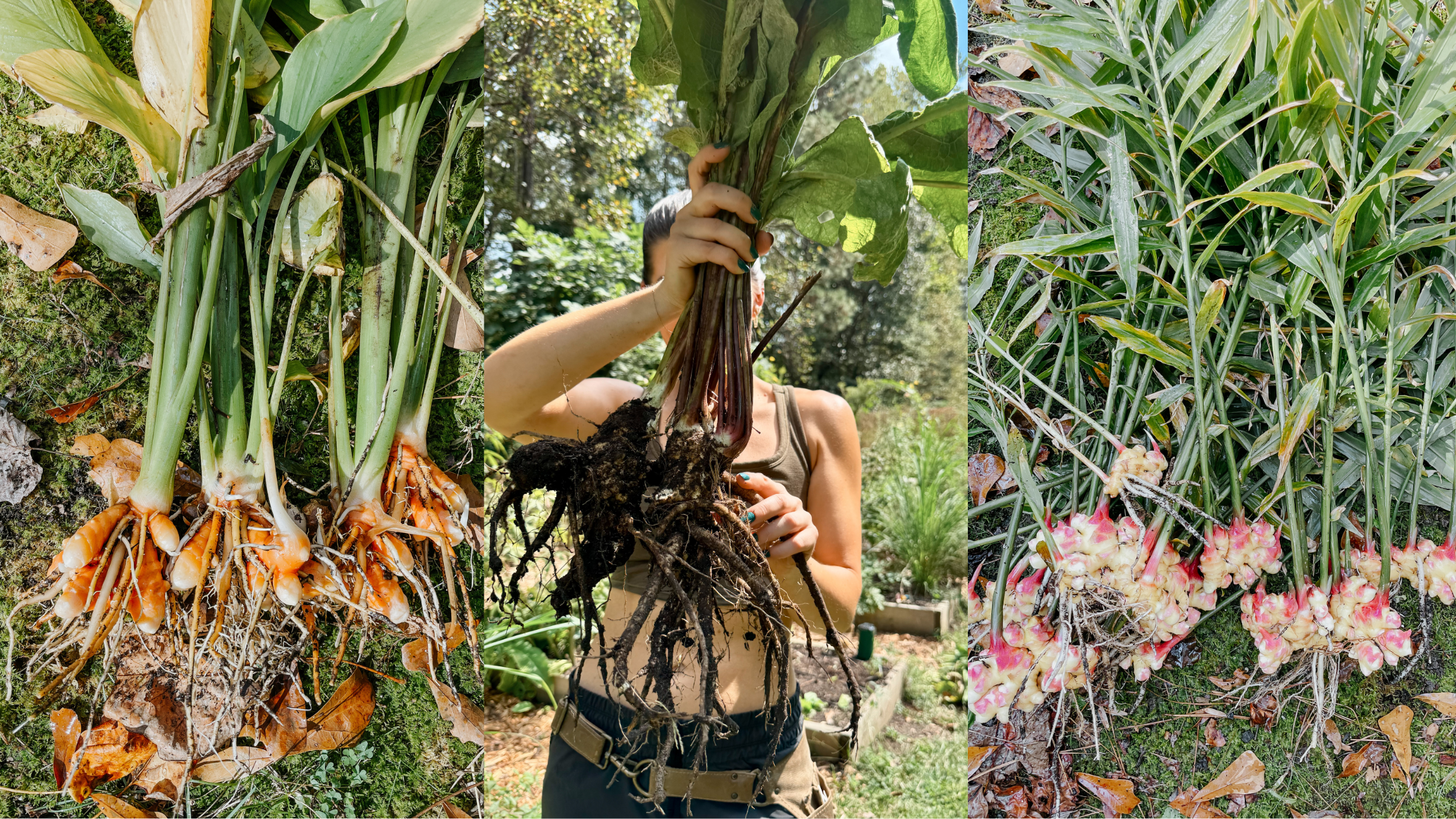Rooted in the Season: Why We Harvest Medicinal Roots in Fall
As the trees drop their leaves and the garden begins to quiet, it’s tempting to think that the growing season is over — but for herbalists and gardeners alike, fall is one of the most potent times of year. Why? Because it’s root season.
While the above-ground parts of plants fade back, their energy doesn't disappear, it descends, drawing down into the roots. It’s there, under the surface, that these plants concentrate their nutrients, essential oils, and medicinal compounds.
This is why fall is the ideal time to harvest roots. The medicine is resting in the soil, and we’re invited to root down and receive it.
Why Harvest Roots in the Fall?
As summer ends and cooler days arrive, perennial plants begin their natural cycle of dying back. This isn’t a loss, it’s a strategic retreat. Plants pull their energy, moisture, and minerals from their leaves and stems down into their roots to survive winter and prepare for spring.
From an herbalist’s perspective, this is the most medicinal time to dig. Roots are densest, most potent, and energetically “complete.” You’re getting the full strength of the plant's life force, not just its nutrients, but its resilience.
Harvesting roots in fall is both a science and a ceremony, a way of connecting with the season’s wisdom of grounding, nourishment, and preparation.
What Roots Offer Us Medicinally
Roots are deeply restorative. While leaves and flowers often act quickly, roots tend to be slow and steady, working from the inside out to strengthen our systems over time.
Medicinal roots can:
Support immune function and resilience
Soothe inflammation and digestion
Help clear congestion and support the lungs
Nourish the nervous system and improve stress response
Act as gentle detoxifiers for the liver and lymph
In other words, they’re exactly what our bodies crave as the days get colder and slower.
8 Powerful Roots to Know & Grow
Let’s dig into some of our favorite fall-harvested roots — many of which we carry at Planted Wellness Co as live plants, dried herbs, or tinctures:
Ginger Root (Zingiber officinale)
Actions: Warming, anti-inflammatory, anti-nausea
Best for: Digestion, circulation, immune boosting
How to use: Fresh or dried in teas, tinctures, or cooking
Bonus: You can harvest Georgia-grown ginger in late October/November, right on time!
Turmeric Root (Curcuma longa)
Actions: Anti-inflammatory, antioxidant
Best for: Joint health, inflammation, skin, digestion
How to use: In tinctures, golden milk, or infused into oils
Valerian Root (Valeriana officinalis)
Actions: Nervine, sedative, muscle relaxant
Best for: Insomnia, tension, anxiety
How to use: Tincture or tea (note: the smell is strong but the effect is worth it)
Marshmallow Root (Althaea officinalis)
Actions: Demulcent, soothing, anti-inflammatory
Best for: Dry coughs, sore throat, digestive upset
How to use: Cold infusions (to preserve mucilage), or added to tea blends
Ashwagandha Root (Withania somnifera)
Actions: Adaptogen, stress modulator, immune tonic
Best for: Chronic stress, hormone balance, fatigue
How to use: Powdered in warm drinks, or tinctured
Dandelion Root (Taraxacum officinale)
Actions: Liver tonic, detoxifier, digestive aid
Best for: Supporting liver health, gentle detox, increasing bile flow
How to use: Roasted for tea/“coffee,” or steeped fresh
Elecampane Root (Inula helenium)
Actions: Expectorant, antimicrobial
Best for: Congestion, wet coughs, bronchial infections
How to use: Dried root decoction or tincture
Echinacea Root (Echinacea purpurea)
Actions: Immune stimulant, lymphatic
Best for: Early-stage colds, immunity building, wound healing
How to use: Tincture or decoction, root is more potent than aerial parts!
Tips for Root Harvesting
Harvesting from your garden?
Wait until after a few frosts, this tells the plant to pull energy down into its roots
Use a garden fork to gently loosen soil and remove the root whole
Rinse well, chop, and dry thoroughly (or tincture fresh)
Always wait until at least year 2 or 3 to harvest, allowing time for the plant to grow and send its energy to the roots
Rooted In Rhythm
There’s a reason nature leads with roots in the fall. This season asks us to slow down, nourish deeply, and prepare for the months ahead. These roots, quiet, powerful, and often overlooked, remind us that strength starts underground.
So whether you’re sipping on ginger tea, tincturing your elecampane, or planting echinacea for next year’s harvest, know this: you're participating in an ancient, beautiful rhythm.
Want to learn more or stock up?
Visit our shop or find us at our next local market, our roots are waiting for you.

